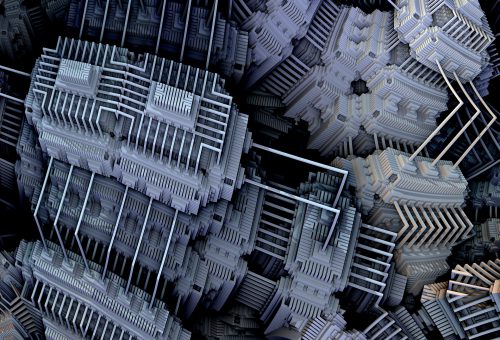The method uses quantum properties to exchange secret information, such as an encrypted key, which can then be used to encrypt messages transmitted over an insecure channel. QKD's security is based on fundamental laws of nature and physics, which are resistant to increasing computing power, new attack algorithms or quantum computers

Researchers at the Nanyang Technological University in Singapore (NTU Singapore) have developed a quantum chip a thousand times smaller than current quantum configurations. The results of the team, led by Professor Liu Ai Kun from NTU's School of Electrical and Electronics Engineering and Associate Professor Kwok Leung Chuan, were published in the journal Nature Photonics.
The results offer a new possibility to apply methods of quantum cryptography in many financial systems. This new chip will improve the security aspect of various communication methods, from withdrawing cash from an automated teller machine to purchasing products online. These are technologies that today are not very safe and it is possible to intercept their communications. The chip, which is only 3 to 4 mm wide, uses quantum communication algorithms and provides a higher level of security than current devices thanks to quantum key exchange (QKD).
QKD uses quantum properties to exchange secret information, such as an encrypted key, which can then be used to encrypt messages transmitted over an insecure channel. QKD's security is based on fundamental laws of nature and physics, which are resistant to increasing computing power, new attack algorithms or quantum computers.
In quantum cryptography, the key (the means by which a message can be encrypted and thus made readable again) is encrypted in a series of photons that are transmitted between the two parties that must share a message (for example, through the optical fiber). According to the Heisenberg Uncertainty Principle (according to which it is impossible to know two characteristics of a quantum object at the same time), anyone wishing to obtain the key cannot do so without disrupting these (polarized) photons. In fact, anyone who intervenes in communication changes its characteristics, leaving a footprint that allows interested parties to notice the intrusion.
Professor Liu said: “In today's world, cyber security is very important because so much of our data is stored and transmitted digitally. Almost all digital platforms and repositories require users to enter their passwords and biometric data, and as long as this is the case, they can be eavesdropped or deciphered. The quantum technology eliminates this, because the password and the information are both integrated within the message sent, creating a quantum key."
It is difficult to overstate the importance of the discoveries that quantum computing can bring to fields such as artificial intelligence, medical diagnosis and drug therapy, just to name a few. A quantum computer is a tool where the number of operations required to achieve a certain result is exponentially low. Innovation is not in the greater speed of each individual action but in the limited number of actions needed to reach a result.
However, our information security risks a crisis due to the introduction of future quantum computers, equipped with large computing resources, which can overcome current cryptographic techniques. For this reason, quantum and post-quantum cryptography will become increasingly important.
More of the topic in Hayadan:

6 תגובות
Do you think that if I start studying electrical and electronics engineering at Kinneret College I will be able to progress to these levels? I'm interested in advancing in the start-up field and I'm very interested in electricity, so if it's an option to enter the field, maybe that's what I should do. Has anyone studied electrical and electronics engineering at Kinneret?
https://www.kinneret.ac.il/program/%d7%aa%d7%97%d7%95%d7%9e%d7%99-%d7%9c%d7%99%d7%9e%d7%95%d7%93/%d7%91%d7%99%d7%aa-%d7%94%d7%a1%d7%a4%d7%a8-%d7%9c%d7%94%d7%a0%d7%93%d7%a1%d7%94/b-sc-%d7%91%d7%94%d7%a0%d7%93%d7%a1%d7%aa-%d7%97%d7%a9%d7%9e%d7%9c-%d7%95%d7%90%d7%9c%d7%a7%d7%98%d7%a8%d7%95%d7%a0%d7%99%d7%a7%d7%94/
Lol this site has become a joke, Quantum is mentioned here many times without understanding the meaning and why it is not possible to develop such a chip and why it is not applicable.
To Moshe, are you sure that this is really for sure on Wikipedia? How to prove that it is certain? And in Wikipedia it says only XNUMX percent truth?
Neither quantum nor shoes, the researcher found a more secure method until it was hacked, which to his credit minimized the data, quantum is a very general concept that characterizes entire theories of minimization and a different behavior of particles from the accepted model. Every year another particle is found and they still haven't scratched the surface of The theory that is also challenged by quite a few scientists.
Neither quantum nor shoes, the researcher found a more secure method until it was hacked, which to his credit minimized the data, quantum is a very general concept that characterizes entire theories of minimization and a different behavior of particles from the accepted model. Every year another particle is found and they still haven't scratched the surface of The theory that is also challenged by quite a few scientists.
You should read the QKD entry on Wikipedia to understand that this is a fuss about nothing: it is about creating a secure channel under the assumption that a classically secure channel is already given